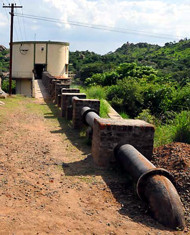Single News
Stopping the water from flowing away
Water researchers from Witten-Herdecke University in Germany are involved in a project in India to stop water losses. The aim is to provide a more reliable water supply not just in the major cities but also in more rural areas.
WITTEN-HERDECKE (NNA) – Water losses are a major problem in emerging economies like India. Rapid urbanisation, the growth of population, economic development and the contamination of regional water resources have further led to a rapid increase of the supply deficit and severe problems for national health and welfare.
It is in this context that researchers from Witten-Herdecke University in Germany are involved in a pilot project to reduce water losses and provide a reliable and sustainable water supply. WaLUE stands for “Water losses in urban environment” and the project is being piloted in the Indian state of Tamil Nadu.
“More than half the water simply disappears from the pipes – through leakage or theft or any number of other reasons. Seeking to prevent this is much more effective than building new dams or desalination plants,” explains project leader Prof. Dr. Karl-Ulrich Rudolph.
The Witten researchers are just back from an inspection trip to Tiruvannamalai near Chennai in southern India where they were checking the state of the measuring equipment. They were happy to report that the equipment had survived unscathed despite being covered for two months by dirty water and debris in a flood which was a one-in-a-hundred-years event.
The project is a collaboration between German and Indian partners and is funded by the German Research Ministry.
Improving lives
“Considerable success has already been achieved in the major cities of India and other emerging economies. The WaLUE project aims to extend this to smaller towns, effectively into the countryside,” Prof. Rudolph explains.
“How do we have to adjust the control systems for the pumps, water pressure and network management as a whole? How can we stabilise the frequent total failure of the water supply? What machinery and software work best to discover leaks? Those are our research questions – and of course the issues that affect the local people,“ he adds.
But the Witten water experts are not only concerned with the purely technical questions. The aim is also to create a business model that ensures reliable and sustainable operation. To this end they are working closely with the German KfW development bank.
In addition to being made reliable, it also had to be possible for local workmen and technicians to maintain the water supply.
“We want to make a lasting improvement to the lives of the people. But that will only work if international and local banks can secure the water supply financially on a sustainable basis,” says Prof. Rudolph. That also included, for example, sensitivity in pricing, that is the water charges: “After all, people only want to pay money for something that works reliably.”
Once the water supplies were repaired and properly organised and worked better, then this helped not only the people, it was also the case that fewer chemicals were needed for purification. Energy efficient pumps contributed to protecting the climate.
Once the pilot project in Tiruvannamalai has been successfully completed, the WaLUE concept will be rolled out to similarly sized towns in other parts of India and other emerging economies.
END/nna/nh/cva
Item: 160404-01EN Date: 4 April 2016
Copyright 2016 News Network Anthroposophy Limited. All rights reserved.

